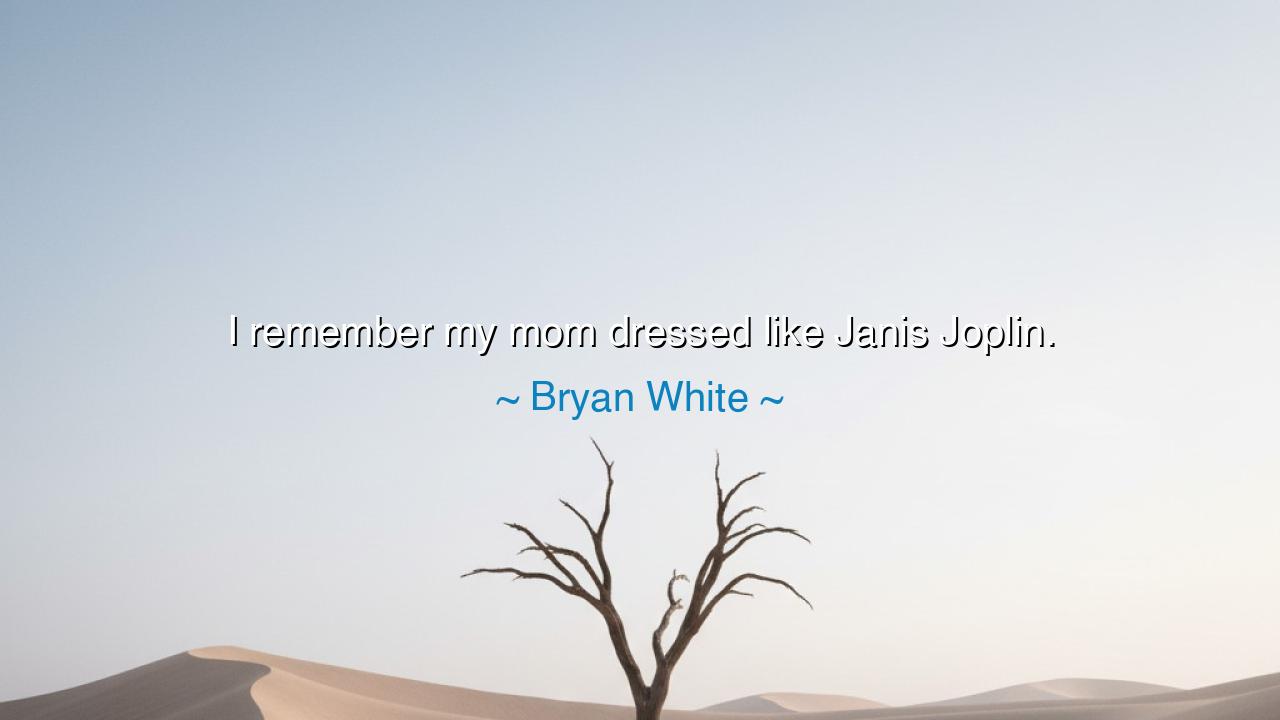
I remember my mom dressed like Janis Joplin.






When Bryan White said, “I remember my mom dressed like Janis Joplin,” he spoke not merely of clothing or fashion, but of spirit—the wild, untamed fire of a generation that believed in freedom, expression, and the courage to live authentically. His words carry the scent of nostalgia, the tender ache of remembering one’s roots. In the simple image of a mother dressed like Janis Joplin, he captures a time when music was more than sound—it was rebellion, it was hope, it was identity. The memory is not just about what she wore, but about what she represented: a woman who dared to be herself in a world that often demanded conformity.
Janis Joplin, the legendary voice of the 1960s, was more than a singer—she was a symbol of raw honesty. Her wild hair, her vibrant clothes, her soulful cry—all of it spoke to a generation searching for truth beyond the walls of tradition. To “dress like Janis Joplin” was not to imitate fashion, but to embrace a philosophy: that one’s spirit should be worn openly, that beauty lies in imperfection, and that life must be lived without apology. When Bryan White recalls his mother in that form, he is remembering a woman who carried that same fire—a mother whose very appearance whispered freedom to her child’s young eyes.
There is profound meaning in such a memory. Every child, whether they realize it or not, is shaped by the silent stories told by their parents’ choices. A mother who dresses boldly teaches her child that self-expression is not arrogance, but courage. She teaches that to live truthfully is an act of art. When Bryan White saw his mother echoing the spirit of Janis Joplin, he was not simply seeing her clothes—he was witnessing the passing of a torch, from one generation of dreamers to another. The music, the colors, the defiance—it all became part of the rhythm of his own soul, eventually shaping the artist he would become.
The origin of such a statement lies in the golden age of counterculture, when artists like Janis Joplin, Bob Dylan, and Jimi Hendrix led a quiet revolution against conformity. They taught people to listen not only to sound but to meaning—to feel the pulse of authenticity in their lives. Many women of that era, like Bryan’s mother, adopted that energy not out of imitation, but out of awakening. They wore their clothes like armor, their laughter like protest, their music like prayer. The young saw them and learned that individuality was sacred—that life’s truest beauty blooms in the courage to be different.
History offers many parallels to this inheritance of spirit. Consider the ancient Greek mothers who told their children stories of Athena, goddess of wisdom and war, not to glorify battle, but to show that intellect and strength could coexist in the same soul. Or the mothers of the Renaissance, who passed to their children the love of color, art, and inquiry that would later define an age. In every era, mothers have been the quiet transmitters of culture—through gesture, tone, dress, and the music of their laughter. Bryan White’s recollection of his mother is part of this eternal chain, where spirit is handed down not through instruction, but through example.
And yet, there is a sweetness, even a melancholy, in his tone. To remember one’s mother in such vivid imagery is to realize how time transforms both people and meaning. The woman who once dressed like Janis Joplin may now wear simpler clothes; the child who watched her may now carry her legacy in a different form—through song, through love, through memory. This is how the spirit of art survives: not frozen in fashion, but living in the hearts of those who remember. The garments fade, but the courage behind them does not.
The lesson in this quote is simple but powerful: never underestimate the influence of authenticity. What you choose to express—your art, your manner, your spirit—becomes part of the inheritance of those who watch you. A child’s memory of a parent’s courage can become the seed of their own destiny. Like Bryan White, remember those who lived with color and truth, and let their example inspire you to live without fear of judgment. Dress your life, not merely your body, in honesty.
So, let the teaching of this moment be carried forward: be unafraid to show who you are. Whether through song, through color, through the way you walk through the world—let your life speak boldly. For one day, someone will remember you not for what you owned, but for how you made them feel free. Just as Bryan White remembered his mother dressed like Janis Joplin—not as a costume, but as a symbol of courage, creativity, and the radiant beauty of being utterly, fearlessly oneself.






AAdministratorAdministrator
Welcome, honored guests. Please leave a comment, we will respond soon